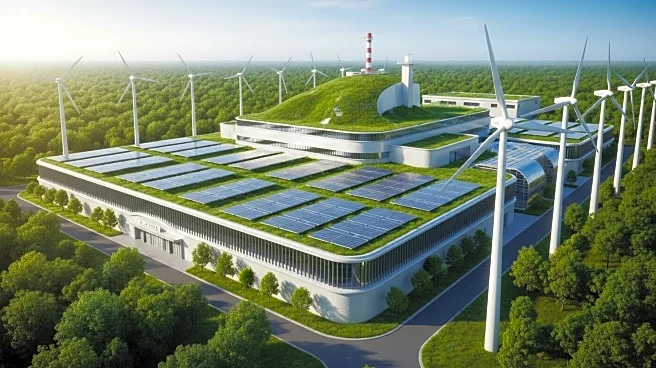What's Happening?
Manufacturers are increasingly prioritizing sustainable technologies to meet urgent sustainability goals. Key areas of focus include improving existing technologies, innovating in battery production, and enhancing supply chain efficiency. Experts from the University of Cambridge's Institute for Manufacturing (IfM) emphasize that while new innovations are important, significant sustainability gains can be achieved by optimizing current technologies. This includes making technology purchases that are energy, water, and material efficient. In battery technology, there is a push towards developing Li-ion batteries with less environmental impact, such as those with reduced cobalt content and solvent-free manufacturing processes. Additionally, digital tools like AI and blockchain are being leveraged to create more resource-efficient supply chains.
Why It's Important?
The shift towards sustainable technologies is crucial for reducing the environmental footprint of manufacturing processes. By focusing on existing technologies, manufacturers can achieve immediate sustainability improvements without the need for significant new investments. This approach not only supports environmental goals but also prepares organizations for future technological advancements. The development of more sustainable battery technologies is particularly important for the electrification of vehicles and renewable energy storage, which are key components in combating climate change. Furthermore, enhancing supply chain efficiency through digital tools can lead to reduced waste and better resource management, benefiting both the environment and the bottom line of businesses.
What's Next?
As manufacturers continue to integrate sustainable technologies, there will likely be increased collaboration between industry, academia, and policymakers to address the challenges and opportunities presented by these innovations. The focus will be on overcoming resistance to change and ensuring that new technologies are adopted effectively. This may involve developing better decision-making frameworks and utilizing digital enablers to facilitate transformational shifts. The ongoing dialogue at forums like the Cambridge International Manufacturing Symposium will be crucial in sharing insights and strategies for successful implementation.
Beyond the Headlines
The emphasis on sustainable technologies highlights a broader cultural shift towards environmental responsibility in the manufacturing sector. This shift is not only about technological advancements but also about changing mindsets and business practices. The COVID-19 pandemic demonstrated the potential for rapid adaptation and transformation under pressure, suggesting that similar large-scale changes could be achieved in response to environmental challenges. As organizations become more adept at integrating sustainability into their operations, they may also influence consumer behavior and expectations, further driving the demand for eco-friendly products and practices.










